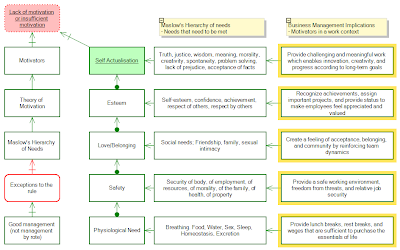This Southbeach model shows a perspective of Peter F. Drucker; "the man who invented management". The column on the left represents qualities of the people in an organisation, and on the right, we have the activities of the organisation itself. These two systems are inextricably interlocked and require each other in order to succeed.
In Drucker's book, The Practice of Management, at the beginning of Chapter 13: The Spirit of an Organisation, he says:
"Two sayings sum up the 'spirit of an organisation'. One is the inscription on Andrew Carnegie's tombstone:Drucker believed that the key to excellence is focussing on people's strengths, and that recognising excellence, encouraging excellence, rewarding excellence, and providing full scope for individual excellence is what creates good spirit in individuals. Furthermore, it is this good spirit that provides the motivation that leads people to excel and do the best they can do rather than just enough to get by.Here lies a man
who knew how to enlist in his service
better men than himselfThe other is the slogan of the drive to find jobs for the physically handicapped:
It's the abilities,
not the disabilities,
that count.Management by objectives tells a manager what they ought to do. The proper organisation of their job enables them to do it. But it is the spirit of an organisation that determines whether they will do it. It is the spirit that motivates, that calls upon a person's reserves of dedication and effort, that decides whether they will give their best or do just enough to get by."
The excellence of the organisation then, is the result of making this excellence productive for others so that the overall strength of the organisation is amplified by the strengths of all the individuals within it, each of their weaknesses being counteracted by the strengths of those around them.
In the 1950s, Drucker was the first to say that people should be treated as assets, and not as liabilities to be eliminated, the first to argue that substance was more important than style and that good practice would always win out in the end over charismatic or cult leaders. Drucker originated the view of the corporation as a human community built on trust and respect for the worker and not just a profit-making machine.Sustainable success for an organisation is a result of individual success at every level, and individual success is enabled and amplified by the organisation that focuses on its people and on building on their successes.
How can we create successful individuals?
How can an organisation make the most of its people assets?
Management must invest the effort in understanding what people have to offer in order that they can focus on their strengths to enable them to build on their abilities and create success. Building on people's abilities builds their spirit, as does individual success. This creates a company spirit that leads to the success of the organisation as a whole. Focusing on people's weaknesses on the other hand, and building on their disabilities, often results in failure and destroys the spirit of the individual. An organisation's spirit is a result of the spirit of its individuals. So take Peter Drucker's advice, and spend the time and effort to understand what people have to offer and build on their strengths.



